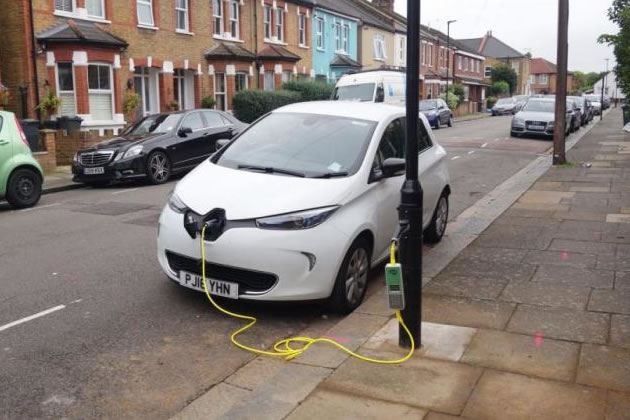London Could Need 60,000 Electric Vehicle Charging Points
Report says lack of available land obstacle to expanding infrastructure

Number of charing points needs to increase significantly. Picture: Wandsworth Council
London may need up to 60,000 electric vehicle charging points by 2030 to support the shift to greener transport, TfL has revealed.
Published last week, the Mayor of London’s 2030 electric vehicle infrastructure strategy includes modelling from TfL that estimates between 40,000 and 60,000 electric vehicle charging points will be needed in the capital by the start of the next decade, 4,000 of which will need to be rapid charge points.
There are currently just over 7,000 charging points for electric vehicles within the M25 boundary, 300 of which are rapid charging points that can fully charge a vehicle’s battery in around 30 minutes.
In the past year, around 2,000 new charging points have been introduced in London, some of which are exclusively reserved for use by electric black cabs.
The mayor’s strategy has identified a lack of available land as one the biggest obstacles to expanding electric vehicle infrastructure in London, and has suggested using public sector land to accommodate up to 1,000 rapid charging points.
Christina Calderato, director of transport strategy and policy for TfL, said: “London’s toxic air reduces the length and quality of lives across the city and contributes to climate change. Improved electric vehicle infrastructure can support more essential trips being made using zero-emission transport, which will help tackle the twin dangers of air pollution and the climate emergency.
“Since we published the Mayor’s Taskforce EV Infrastructure Delivery Plan in 2019 the number of EV charge points in London has increased by 55 per cent, and now accounts for approximately a third of all charge points in the UK.
“The innovative approach to unlocking public sector land in the capital, set out in the Mayor’s 2030 Electric Vehicle Infrastructure Strategy, will accelerate the delivery of much needed rapid charge points even further, supporting better access for all users in all areas of London.”
While the plan to expand electric vehicle charging infrastructure has been mostly welcomed, the London Cycling Campaign has stressed that electric cars “can only be part of reducing transport emissions”.
Simon Munk, campaigns manager at London Cycling Campaign, said: “We need a rapid rollout of charging points for EVs. But we also need to be clear that EVs can only be part of reducing transport emissions. The Climate Change Committee has been clear we need to reduce driving and enable alternatives to using cars, electric or not, as a priority for emissions. And of course, electric cars won’t fix London’s crises of congestion, road danger, inactivity either, and won’t fix pollution issues completely. The big priority has to be enabling more walking & cycling and improving public transport.”
The Government’s plan to ban the sale of new petrol and diesel cars from 2030, as well as regional clean air policies such as ULEZ and the ULEZ expansion, has seen demand for new electric vehicles increase by more than 30 per cent in the past year.
But a surge in demand and a global shortage of semiconductors has seen supply issues disrupt the electric vehicle market, with would-be buyers facing waiting lists of up to a year for a brand-new electric car.
Autotrader has estimated that sales of electric vehicles could overtake sales of petrol and diesel vehicles by as early as 2025, while the ban on new petrol and diesel cars could see them disappear from Britain’s roads almost entirely by the mid-2040s.
Joe Talora - Local Democracy Reporter
October 20, 2021